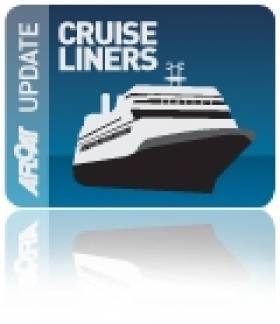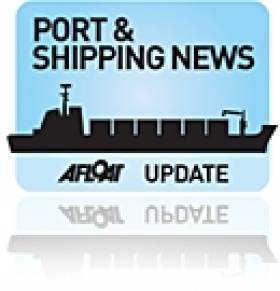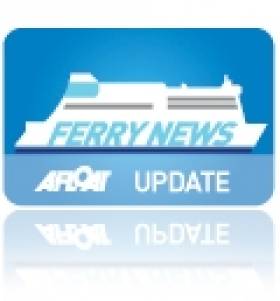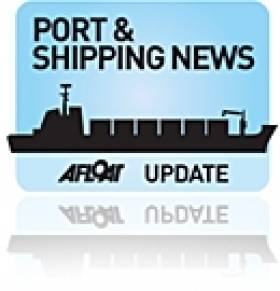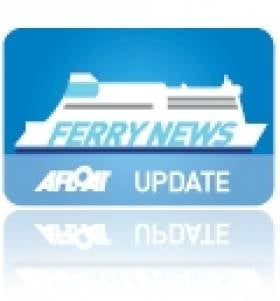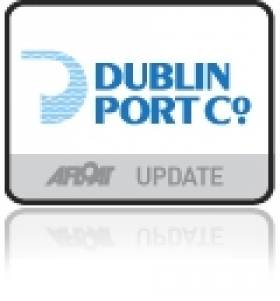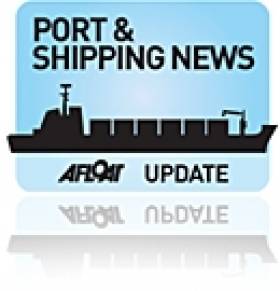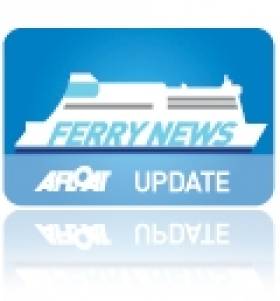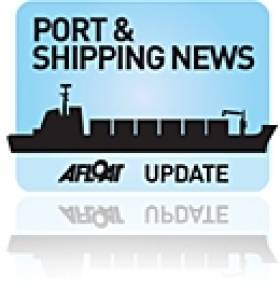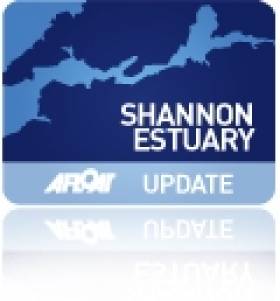Displaying items by tag: Ports and Shipping News
Giant Cruiseship Cobh Cruises Direct to Norway
#NORWAY CRUISES – Irish cruise passengers will for the first time be able to travel directly from Ireland on a major cruiseship, courtesy of deal between a travel agency and Royal Caribbean International Line.
Spaces have been reserved for 200 Irish passengers on the cruise line's 4,375 passenger giant Independence of the Seas (154,407 tonnes), which will dock in Cobh, Co Cork, next year. She is to offer 12-day cruises of the Norwegian fjords, starting on June 3 and September 9.
From €1,699 per person, based on two people sharing, passengers will get all meals and entertainment on board and return flights from Southampton to either Cork or Dublin. For more on this story the Irish Examiner has a report.
New Irish Cargoship Strikes Rock on Maiden Voyage
#IRISH CARGOSHIP - A brand new Irish flagged cargoship, Huelin Dispatch (2012/2,545grt) while on its maiden voyage struck a rock off Alderney, one of the Channel Islands, last Friday, writes Jehan Ashmore.
The Dutch built 89m newbuild registered in Dundalk, was making her inaugural round trip cargo service from Southampton and was scheduled firstly to arrive in Jersey followed by a call to Guernsey.
According to the BBC News the £8.8m newbuild ran aground having contacted an isolated rock one and a half miles south-west of Alderney and where the captain of the vessel issued a distress call.
A lifeboat came to the scene within 15 minutes and all eight crew of the stricken cargoship were reported safe, though water was found coming in at the stern of the vessel. The leak was contained and the vessel was floated off the rock.
Huelin Dispatch then proceeded under her own power and she is currently in dry dock in Falmouth. Her Jersey based owners Huelin-Renouf Shipping await the findings of the dry dock inspection so to determine its return date.
Since the incident, the company initiated a contingency plan, which has allowed its freight service to resume service.
The newbuild (89m x 12m x 4.4m) was built in Bergum by the Damen Shipyard Group and she is one of the yards 'Combi Freighter' designs, these vessels are capable of carrying 188 TEU containers.
Irish Ferries wins 'Best Ferry Operator' at UK Awards Ceremony
#FERRY AWARD – Irish Ferries has won the 'Best Ferry Operator' award at a ceremony held recently in Birmingham. The award was presented to the ferry operator by Group Leisure, a leading British travel trade publication.
Irish Ferries won in the category on foot of votes cast by members of the public, drawn from sports and social clubs, retirement groups and special interest societies amongst others, across the UK.
Accepting the award, Irish Ferries passenger sales manager Marie McCarthy thanked those responsible for their recognition and added, 'we pride ourselves on the quality of our fleet and the high levels of service offered by our staff and we are delighted to see this acknowledged by our fellow industry professionals'.
Irish Ferries operates two services on the Irish Sea, the Dublin-Holyhead route, served by the cruiseferry Ulysses and fast-ferry Jonathan Swift. The second route is between Rosslare-Pembroke Dock which is served by the cruiseferry Isle of Inishmore.
Ports & Shipping Review: Stena HSS Comes and Goes, Shackleton Exhibition, Cork Harbour Open Weekend,Cargoship Dispute and Ferry Strike
#PORTS & SHIPPING REVIEW - Over the last fortnight Jehan Ashmore has reported from the Shipping scene where the Stena Line HSS seasonal-only operated Dun Laoghaire-Holyhead service completed its final sailing for the summer, though sailings are to resume over Christmas/New Year period.
Despite the HSS Stena Explorer's last high-season sailing on 11 September, the fast-ferry made a return call to Dun Laoghaire five days later, for a special freight-only charter, to load stage trucks following the Lady Gaga concert held in the Aviva Stadium, Dublin.
Incidentally the ferry terminal in Dun Laoghaire now features a new exhibition space, where the Tanaiste Eamonn Gilmore, T.D. officially launched the Shackleton Endurance Exhibition – 'Triumph Against All Odds'.
The Cork Harbour Open Weekend provided a great opportunity for locals and visitors alike to see what the world's second largest natural harbour has to offer, in terms of activities held on and off the water, including trips to Spike Island.
At Cobh a detained French registered fishing vessel was escorted to the town by the Naval Service OPV L.E. Roisin, following alleged breaches of technical fishing regulations.
A Dutch owned cargoship, the Julia, which docked in Drogheda Port faced arrest, following claims by its crew that they were owed in total $102,700 in unpaid wages to them.
The summer may be over, but that's not stopping Irish Ferries offering Autumn short shopping breaks and wine mini-cruises on the route to Cherbourg.
While rivals Celtic Link Ferries, found themselves taking additional business at short notice, as passengers were transferred from the cancelled Brittany Ferries Roscoff-Cork sailing, following strike-action by French staff over a dispute on new working conditions.
Celtic Link Ferries will however be expecting a response from customers as they take part in Gathering 2013, as the ferry operator are offering free car travel on 15th March next year in advance of St. Patricks Day celebrations.
Leo Varadkar, Minister for Transport, has appointed James Frater to the board of the Dublin Port Company. The Scot has held senior positions at ports in the UK, Egypt, Hong Kong and Oman.
Strike Action Leads to Cancelled Brittany Ferries Sailings
#SAILINGS CANCELLED – Due to a series of wildcat strikes yesterday by French employees of Brittany Ferries, the company has cancelled sailings on the Cork-Roscoff route until further notice and on its other routes to the UK and Spain.
The cancellation of sailings on the weekend only (round-trip) operated Irish route, led to passengers having to take alternative travel arrangements. Instead of departing Roscoff last night, passengers were given passage on board last night's departure from Cherbourg using the Celtic Link Ferries service to Rosslare, which is scheduled to arrive later today at lunchtime.
It has been suggested by Brittany Ferries, that customers who had booked on today's (cancelled) 16.00hrs sailing from Cork to Roscoff, should instead depart Rosslare with Celtic Link Ferries or Irish Ferries which also operates to Cherbourg.
For information and sailing updates from Brittany Ferries click HERE.
Minister Appoints Frater to Board of Dublin Port
#DUBLIN PORT – Leo Varadkar, Minister for Transport, has appointed James Frater to the board of the Dublin Port Company.
The Irish Times reports that the Scot has held senior positions at ports in the UK, Hong Kong and Oman.Dublin Port is the country's largest such facility, handling roughly half of the State's trade.
Cargoship Faces Detention Over Unpaid Crew Wages
#CARGOSHIP DISPUTE – A cargoship docked in Drogheda Port, Co. Louth, could face arrest if Dutch based Tranship Management, does not immediately pay the crew in unpaid wages, according to Ken Fleming of the International Transport Workers Federation.
Fleming who is the co-ordinator for the ITF in Ireland and Britain, has warned the company that they immediately pay the nine men crew of the Julia, who claim $102,700 is owed in total to them.
The Eastern European crew of the 3,870grt freighter are from the Ukraine, Russia and Lithuania, and they claim they have not had not been paid since May.
Mr. Fleming said, "We are seeking payment in full of the arrears owed to these men, all but one of whom wants to be repatriated because of the intolerable conditions on the vessel".
"The company faces a very simple choice, either they transfer the arrears to their local agent for immediate disbursement to the crew or I will be applying to the Admiralty Marshal of the High Court for the ship's arrest."
The ship built in 2006, has a consignment of 5,000 tons of cement on board for Belgium, however he added "it will be sitting here in Drogheda if the company does not live up to its commitments. The day is long past since this sort of treatment of seafarers was tolerated in Irish ports."
Stena Line's HSS Service Sounds Good for Lady Gaga
#LADY GAGA– Stena Line's HSS Stena Explorer is set to return to Dun Laoghaire Harbour this Sunday, despite last Tuesday's end of season sailings to Holyhead, as previously reported on Afloat.ie. The HSS has been specially chartered in to transport stage trucks following the Lady Gaga concert to be held this weekend in Dublin, writes Jehan Ashmore.
The US pop-star is to play her only Irish tour date on Saturday night in the Aviva Stadium. Following the New York musician's 'The Born This Way Ball' performance, the stage equipment is to be transported from the Ballsbridge venue by a convoy of 25 freight trucks to the ferryport in Dun Laoghaire for the sailing to Holyhead.
On arrival of the HSS into Dun Laoghaire, the fast-ferry will be in a 'light' mode, i.e. no passengers or vehicles on board. However on the return leg to Anglesey, the craft will be loaded with the stage trucks on the vehicle decks that are capable of loading in total 50 lorries (each of 15m in length).
Upon arrival in Holyhead, the truck convoy will travel 'landbridge' across the UK as they proceed onward to The Netherlands, where the tour continues in Amsterdam, at the cities Ziggo Dome.
However normal HSS sailings are to resume for 12 days over the Christmas /New Year period, for further information visit: www.stenaline.ie/ferry/book-now/hss-christmas-sailings-2012/
Ports & Shipping Review: New Tallships Race and Cruise Operators, Superpower Naval Visitors, School at Sea, Irish Sea Excursions and Wind-Farms
#PORTS & SHIPPING REVIEW - Over the last fortnight Jehan Ashmore has reported from the Shipping scene where after the Irish Navy's role in the Tallships 'Parade of Sail', the inaugural Irish Sea Tall Ships Race finally got underway to Liverpool.
Also making a call to Dublin Port was cruise newcomer Plantour & Partners's whose small cruiseship Hamburg made her debut visit to the capital port.
The following day saw the classic cruiseship veteran Princess Daphne call, she was launched originally as a general cargo-ship serving the UK-Australia and New Zealand trade routes. In the same week her sister Princess Danae was arrested in Dublin Port, for an alleged non-payment of fuel bills. The dispute was eventually settled which saw the H&W built vessel depart for La Rochelle.
Operating profits at Irish Ferries of €3.2m for the first six months of 2012, remained the same compared to the same period last year, according to its parent company ICG which released its financial interim report.
A special call by the USS Fort McHenry (LSD-43), a dock landing ship to Dublin Port was made to coincide with American Football Week which allowed her crew to attend the Emerald Isle Classic showdown between the Navy and Notre Dame. On a related note US students where making their 'Semester at Sea' cruise on board Explorer which had called to Galway Bay and later the capital.
With the US Navy in Dublin, the rebel county had its own rare visit of the Russian Navy, when the destroyer Vice-Admiral Kulakov (626) called to Cobh. On both occasions the public were able to board.
Glasgow based Waverley Excursions have been running several unusual route excursions out of Northern Ireland. The final excursion was scheduled for today with a day-trip between Portaferry, Co. Down and Peel on the west coast of the Isle of Man.
While on waters off the east coast of the Irish Sea's largest island, proposals for an extended wind-farm will not require re-routing of shipping lanes according to developer Dong Energy. They operate the Walney Island wind-farm off Cumbria.
Shannon Foynes Port Company Records €2.9m Profit
#SHANNON FOYNES – An operating profit close to €2.9m for last year (up from €2.5m in 2011) was recorded by Shannon Foynes Port Company (SFPC) according to yesterday's Irish Times.
SFPC recorded a 2.2 per cent rise in turnover to €10.1 million, resulting in a 13 per cent increase in operating margin from 25.5 per cent to 28.1 per cent, according to the 2011 annual report.
The company made a profit attributable to the shareholder of €2.73 million after exceptional items and financing. Cargo increased 8 per cent to 10.1 million tonnes from 9.4 million tonnes in 2010. About 35 per cent of Ireland's bulk traffic transits through SFPC's six terminals on the estuary.


























